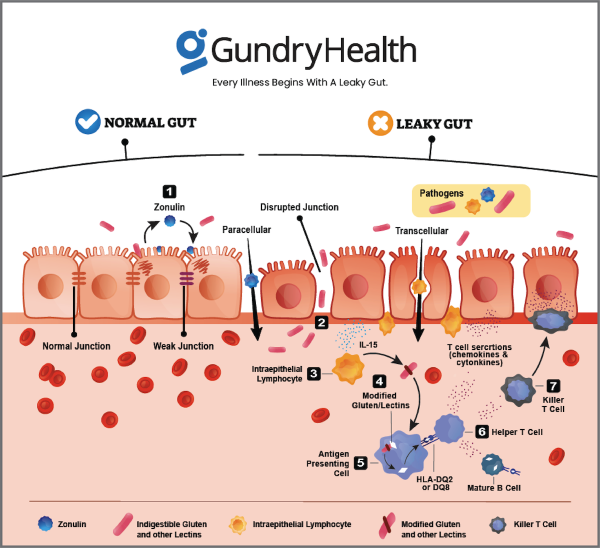What Causes Hypothyroidism? Dr. Steven Gundry Reveals Surprising Cause and Explains His Diet Solution
Learn more about hypothyroidism symptoms, the important nutrient missing from most people’s diets, and a revolutionary new hypothyroidism treatment.
What is hypothyroidism?
The thyroid is a butterfly-shaped organ in the base of your neck. It’s responsible for releasing hormones that control your metabolism and help regulate your energy. And when your thyroid is working properly, you probably never even think it’s there.
Making Hard, Easy.
However, hypothyroidism is a condition where your thyroid gland no longer produces enough of these important metabolism-controlling hormones. So without the right amount of thyroid hormones, your body’s natural functions – like your metabolism – begin to slow down.
Hypothyroidism typically affects people over 60 and is more common among women than men.
What are the signs and symptoms of hypothyroidism?
Hypothyroidism can cause different symptoms in different people, which can often make it very difficult to diagnose. However, there are a few standard signs and symptoms to watch out for. These include some of the following:
- Surprising or sudden weight gain
- General fatigue
- Depression
- Experiencing numbness or tingling in your hands
- Soreness all over the body
- Higher than normal blood cholesterol levels
- Feeling uncomfortable in cold temperatures
- Dry, coarse skin and hair
- Feeling more forgetful (“brain fog”)
- Slowed heart rate
- Decrease in sexual interest
- Physical changes to the face (e.g. drooping eyelids or puffiness)
Symptoms often progress slowly over the course of several years. If thyroid problems persist, these symptoms may become more pronounced and obvious.
What’s the difference between hypothyroidism and hyperthyroidism?
By now, you know that hypothyroidism refers to a decrease in the amount of metabolism- and energy-regulating hormones your thyroid produces.
In contrast, hyperthyroidism is a condition causing your thyroid to produce too much thyroid hormone. This can cause normal bodily processes to speed up, such as your heart rate. It can also lead to weight loss and difficulty sleeping.
Hyperthyroidism is far less common than hypothyroidism, affecting less than 1% of people over the age of 12. Just like hypothyroidism, though, hyperthyroidism tends to affect women and men over the age of 60.
What’s the difference between hypothyroidism and Hashimoto’s thyroiditis?
Both hypothyroidism and Hashimoto’s thyroiditis affect the thyroid. They also both share many of the same signs and symptoms. However, there is one crucial difference: Hashimoto’s thyroiditis is an autoimmune disease.
In Hashimoto’s thyroiditis, the immune system mistakenly attacks the thyroid gland. Over time, these autoimmune attacks destroy healthy thyroid tissue, reducing thyroid hormone production.
Hashimoto’s thyroiditis is the most common cause of underactive thyroid in the United States. And while it mostly affects middle-aged women, it can affect anyone at any age.
What causes hypothyroidism?
Until recently, doctors and scientists had no good idea what causes thyroiditis to develop.
Now, Dr. Steven Gundry, the pioneer heart surgeon and bestselling author, says he’s discovered one of the key causes of low thyroid.
This game-changing research could make a huge difference in the lives of millions of people. And unlike traditional procedures, Dr. Gundry’s method doesn’t require expensive pharmaceutical treatments, invasive surgeries, or costly therapies.
Instead, this is something you can do in the privacy of your own home, at your own pace, with the guidance of a licensed medical professional.
So if you’ve been suffering from symptoms of low thyroid and want to reclaim your health and energy levels, then read on. Because in this report, you’ll learn:
- The surprising cause of low thyroid (and the foods you can add to your diet to help improve your condition today)
- Gundry’s “flavor enhancing” trick for restoring better thyroid function (scientists have known about this “hack” for over 100 years!)
- How you can find out if YOU are suffering from low thyroid (and how to ask your doctor for the right tests)
To understand where hypothyroidism comes from, you first need to know more about how your thyroid gland works.
Your thyroid gland produces the thyroid hormones T4 and T3. These two important hormones regulate the number of calories you burn to maintain your life and generate heat. This is your basal metabolic rate, or BMR.
These days, most medical practitioners (maybe even your doctor) know to use bloodwork to check your thyroid function. What these tests can’t show is if your body is getting thyroid hormones like T4 and T3 where they’re needed.
Unfortunately, this means your blood work could come back “normal.” Yet you may still be experiencing thyroid dysfunction.
To understand why this is, let’s return to how your thyroid gland works. It makes thyroid hormones by getting the mineral iodine from your blood and turning it into T4 and T3.
Then, a part of your brain called the hypothalamus releases a special hormone called TSH. TSH tells your thyroid gland to start producing thyroid hormones.
In his private practice, Dr. Gundry uses TSH to measure how much the receptors in the brain are detecting active forms of the thyroid hormones T4 and T3. And it’s here where Dr. Gundry discovered the surprising source of most people’s low thyroid…
The gut.
You see, to convert your body’s thyroid hormone “ingredients” into usable hormones, you need a healthy gut microbiome. (Your microbiome is the trillions of bacteria living in your gut.)
And inflammation in the gut – called Leaky Gut – can raise your levels of the “stress hormone” cortisol. Rising cortisol levels can then suppress your thyroid hormones.
According to Dr. Gundry, poor gut health is why low thyroid is so common these days.
In other words, a leaky gut means your body can’t make the right amount of thyroid hormone and is blocked from getting these thyroid hormones to where they’re needed in your body.
Discover the “thyroid supporting” ingredient missing from most people’s diets
There’s one ingredient your body needs to produce healthy thyroid hormones. And unfortunately, it’s missing from many of today’s “healthy” diets.
That ingredient is the mineral iodine.
Most people used to get iodine from ocean fish and shellfish. But in the early 1900s, many Americans started moving inland from the coasts. The result? A massive epidemic of low thyroid.
So in 1924, the federal government asked salt companies to add iodine to table salt. And this seemed to solve the problem.
Unfortunately, in our quest for more natural and delicious foods, many of us now use salts like pink Himalayan salt and sea salt. While they may taste great, these natural salts do NOT contain iodine.
Which is why Dr. Gundry has a simple solution for supporting a healthy thyroid: use iodized sea salt.
But if you want to continue using non-iodized salt, you could also add more iodine-rich foods to your diet. Examples include foods like spirulina, chlorella, and seaweed.
(An iodine-rich seafood diet may explain why rates of hypothyroidism in Japan could be as low as 1 percent!)
How to test for low thyroid – and how Dr. Gundry treats hypothyroidism
According to Dr. Gundry, the best way to test for low thyroid is to look at TSH levels (TSH stands for “thyroid-supporting hormone”).
This is because TSH drives your production of thyroid hormones. So when your TSH levels are low, it means your brain believes it has enough thyroid and doesn’t need to send the signal to produce more.
If you’re interested in finding out your TSH levels, ask your doctor to measure your TSH, free T4 and free T3, and reverse T3 levels.
Pay close attention to your TSH. The first number before the decimal point should be a 1 or a 2. If your TSH level is above 2.4 uIU/ml, that’s your brain telling you it’s not getting enough thyroid hormone and is pushing for more. (Please note: according to Dr. Gundry, you should not simply rely on measuring T4 and T3 as these are NOT the active forms.)
Naturally, such tests are a great way to find out whether a low thyroid is at the root of chronic low energy levels and mental fatigue.
However, where Dr. Gundry differs from most conventional doctors is in his holistic approach to low thyroid issues. This means he goes beyond traditional prescriptions for thyroid hormone and instead looks at your full body health.
Dr. Gundry’s holistic approach to hypothyroidism
So for his low thyroid patients, Dr. Gundry first works with his patients to repair their leaky guts and restore a more balanced and diverse gut microbiome.
This might mean cutting certain inflammatory foods out of your diet.
And one of the worst offenders is sugar. Sugar acts like fuel for the bad bacteria that cause a leaky gut. Not to mention sugar is also a naturally inflammatory food.
Dr. Gundry recommends limiting your sugar intake. And if you have a sweet tooth, he suggests eating a small portion of in-season fruit in moderation. Some of Dr. Gundry’s favorite healthy fruits include wild berries, passion fruit, kiwifruit (with skin), and grapefruit.
Another leaky gut culprit is a type of protein called a lectin. Lectins can cause tiny holes to form in your gut lining, which allows bacteria and other invaders to wreak havoc on your gut. Common lectin-containing foods include potatoes, tomatoes, corn, and certain whole grains. (See Dr. Gundry’s YES and NO foods .)
After working on a plan to heal the gut, Dr. Gundry will begin adding iodine back into the patient’s diet (whether through use of iodized salt or iodine-rich seafood like the ones mentioned above).
Only if a patient still isn’t fully responding to this new regimen will Dr. Gundry prescribe traditional thyroid hormones.
While this cure for hypothyroidism may fly in the face of more conventional treatments (like the use of prescription thyroid hormones), it has already helped restore the strength and energy levels of hundreds of Dr. Gundry’s patients (both male and female).
Your personalized hypothyroidism health care plan from Dr. Gundry
And now, thanks to the pioneering work of Dr. Gundry and his team at Gundry Health, this unique program is available to you (without needing an appointment at one of Dr. Gundry’s two West Coast clinics).
So if you are currently experiencing symptoms of low thyroid, or if you’ve recently received a diagnosis for hypothyroidism, experts trained in Dr. Gundry’s unique holistic methods are now available to help you craft your own personalized thyroid routine.







